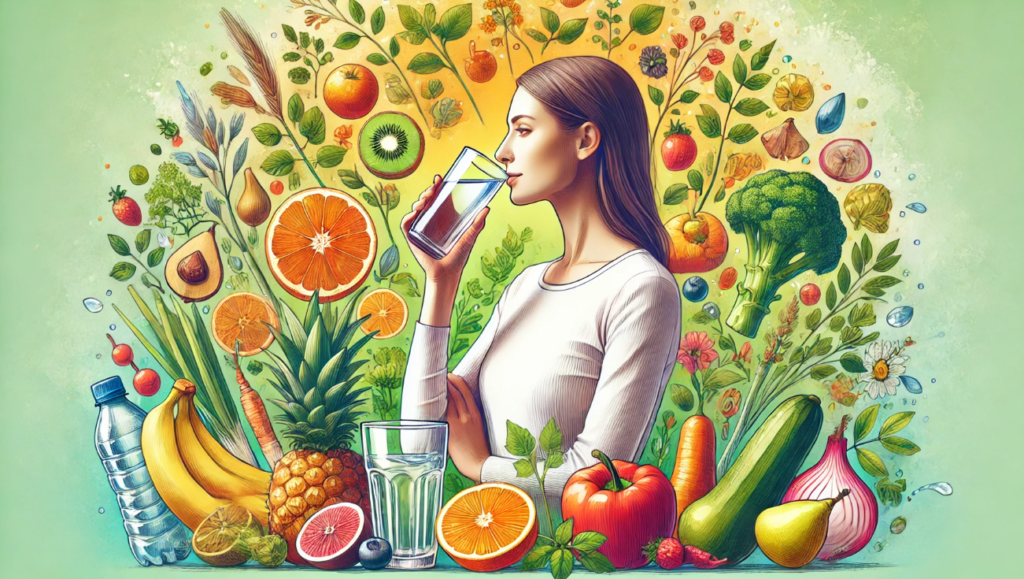Hydration is often overlooked when discussing overall health and wellness, but it plays a crucial role in the proper functioning of the body. We often hear that we should drink enough water, but why is hydration so important? In this blog, we will explore the science behind hydration, its impact on your health, and practical tips on how to maintain optimal hydration levels for your well-being.
What is Hydration?
Hydration refers to the process of providing your body with the necessary fluids to maintain the balance of water and electrolytes in your system. Water is the body’s most essential nutrient, making up around 60% of our total body weight. It helps regulate body temperature, transport nutrients, remove waste, and lubricate joints.
Why Hydration is Important?
Proper hydration is essential for maintaining overall health. Water acts as a medium for numerous vital functions, and without it, the body cannot perform optimally. Here are some of the key reasons why staying hydrated is crucial:
- Regulation of Body Temperature: One of the most important roles of water is to regulate body temperature. When we sweat, the evaporation of sweat cools the body, helping to maintain a stable internal temperature. Dehydration can interfere with this process, making it difficult for the body to cool down during exercise or in hot weather.
- Nutrient Transport: Water is essential for the transportation of nutrients to cells. Blood, which is made up of around 90% water, carries oxygen and nutrients to every cell in your body. Without adequate hydration, the blood becomes thicker, slowing down the delivery of essential nutrients.
- Digestive Health: Hydration plays a significant role in digestion. Water helps to break down food, absorb nutrients, and move waste through the digestive tract. Without enough water, the digestive process becomes slower, and you may experience constipation or other digestive issues.
- Cognitive Function: The brain is about 75% water, and dehydration can affect cognitive function. Studies have shown that even mild dehydration can lead to difficulties in concentration, memory problems, and mood changes. Staying hydrated helps maintain focus, alertness, and mental clarity.
- Joint and Muscle Health: Water acts as a lubricant for the joints, preventing stiffness and discomfort. It also helps to maintain muscle function, preventing cramps and fatigue during exercise. Proper hydration supports overall physical performance and recovery.

Hydration and Health Conditions
Certain health conditions can be worsened by dehydration. For example, kidney stones are more likely to form when you’re not drinking enough water. Dehydration can also exacerbate conditions like urinary tract infections (UTIs), high blood pressure, and even migraines. Hydration helps flush toxins from the body and supports the kidneys in performing their role of filtering waste products.
| Health Condition | Impact of Dehydration |
|---|---|
| Kidney Stones | Dehydration increases the risk of stone formation. |
| Urinary Tract Infections (UTIs) | Dehydration can lead to insufficient urine flow, increasing the risk of infections. |
| Migraines | Dehydration can trigger or worsen migraine attacks. |
| High Blood Pressure | Dehydration can increase blood viscosity, leading to higher blood pressure. |
How Much Water Do You Need?
The amount of water you need to drink depends on various factors such as age, weight, activity level, and the climate you live in. The commonly recommended guideline of “eight 8-ounce glasses of water a day” (about 2 liters or half a gallon) is a good starting point, but it might not be sufficient for everyone.
A more personalized approach is based on your body weight. A general rule of thumb is to drink 30-35 ml of water per kilogram of body weight. For example, a 70 kg (154 lbs) individual would need around 2.1 to 2.45 liters of water per day. However, this number should increase if you’re physically active or in a hot climate.
Signs of Dehydration
Dehydration can manifest in several ways. Common signs of dehydration include:
- Thirst
- Dry mouth
- Fatigue or dizziness
- Dark yellow urine
- Decreased urine output
- Dry skin
- Confusion or difficulty concentrating
If you experience any of these symptoms, it’s important to hydrate as soon as possible to avoid more serious complications.
Best Sources of Hydration
While water is the best source of hydration, there are other fluids and foods that can help keep you hydrated.
- Water: The most obvious and effective source of hydration is plain water. Carry a reusable water bottle with you throughout the day to remind yourself to drink regularly.
- Electrolyte Drinks: Drinks that contain electrolytes (such as potassium, sodium, and magnesium) can help replenish the minerals lost through sweat, especially after intense physical activity or during hot weather.
- Coconut Water: Coconut water is a natural source of electrolytes and is a good alternative to sugary sports drinks. It can help keep you hydrated while providing essential nutrients.
- Herbal Teas: Herbal teas like chamomile, peppermint, and ginger tea can contribute to your daily fluid intake while offering additional health benefits like improved digestion and relaxation.
- Hydrating Foods: Many fruits and vegetables have a high water content and can help with hydration. Some of the best options include cucumbers, watermelon, strawberries, oranges, and celery.
Tips for Staying Hydrated
Here are some practical tips to help you maintain optimal hydration levels throughout the day:
- Start Your Day with Water: Drink a glass of water first thing in the morning to kickstart your hydration and metabolism.
- Set a Reminder: Use your phone or a hydration app to remind you to drink water regularly.
- Drink Before You’re Thirsty: Don’t wait until you’re thirsty to drink water. By the time you feel thirsty, you may already be mildly dehydrated.
- Monitor Your Urine Color: A good indicator of hydration is the color of your urine. Pale yellow urine usually indicates proper hydration, while dark yellow or amber urine signals dehydration.
- Hydrate During Physical Activity: Drink water before, during, and after exercise to replenish the fluids lost through sweat.
- Limit Dehydrating Beverages: Beverages like caffeine and alcohol can have a dehydrating effect, so consume them in moderation and balance them with extra water.
Frequently Asked Questions (FAQ)
Q1: Can I drink too much water?
Yes, while staying hydrated is important, excessive water intake can lead to a condition called hyponatremia, or water intoxication. This occurs when the sodium levels in your blood become dangerously low. It’s important to listen to your body and drink water in moderation.
Q2: Does drinking coffee or tea hydrate me?
Yes, coffee and tea can contribute to hydration, but they contain caffeine, which has a mild diuretic effect. While the hydration benefits of these beverages outweigh the diuretic effect, it’s best to balance them with water.
Q3: Can dehydration affect my skin?
Yes, dehydration can cause your skin to look dry and dull. Proper hydration helps maintain skin elasticity and promotes a healthy complexion.
Q4: How do I know if I am dehydrated?
Common signs of dehydration include dry mouth, fatigue, dark yellow urine, and dizziness. If you experience these symptoms, it’s important to hydrate immediately.
Q5: What’s the best way to hydrate after exercise?
After exercise, it’s important to rehydrate with water and electrolytes. Coconut water, sports drinks, or water with a pinch of salt and sugar can help replenish both fluids and electrolytes.
Conclusion
Maintaining proper hydration is crucial for overall health. Water plays a significant role in various bodily functions, from regulating body temperature to supporting cognitive function. By understanding the importance of hydration and taking proactive steps to drink enough water, you can enhance your health and well-being.
For more health-related tips and resources, visit HealthyVibeHub Blog. Stay hydrated and take care of your body!
By including the keyword hydration throughout the blog, we’ve ensured that it is well-integrated for both readability and SEO.


